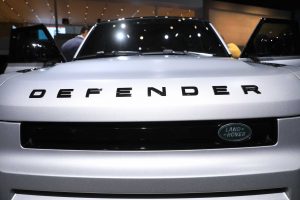Jaguar Land Rover is developing a hydrogen-powered vehicle and plans to test it out this year

- As governments attempt to reduce emissions and boost urban air quality, the vehicles people use look set to change.
- Jaguar Land Rover is one of several automotive companies working on hydrogen-powered vehicles.
In this article
- 7267.T-JP
- 7203.T-JP
- TATAMOTORS-IN
Jaguar Land Rover said Tuesday it was working on the prototype of a hydrogen fuel cell electric vehicle, with testing of the concept slated to start later this year.
The vehicle will be based on the new version of the company's Land Rover Defender, and is part of JLR's broader attempt to meet a target of zero tailpipe emissions by the year 2036. Testing of the vehicle will focus on areas such as fuel consumption and off-road capabilities.
In an announcement, the company — which is owned by Tata Motors — described fuel cell electric vehicles as being "complimentary to battery electric vehicles … on the journey to net zero vehicle emissions."
"Hydrogen-powered FCEVs provide high energy density and rapid refuelling, and minimal loss of range in low temperatures, making the technology ideal for larger, longer-range vehicles, or those operated in hot or cold environments," the company added.
As governments attempt to reduce emissions and boost urban air quality, the vehicles people use do look set to change.
The U.K., for instance, plans to stop the sale of new diesel and gasoline vehicles from 2030. From the year 2035, all new cars and vans will need to have zero tailpipe emissions.
Companies such as JLR are, slowly but surely, attempting to adapt to this new reality. Earlier this year, the firm announced its Jaguar brand would go all-electric from the year 2025. The business also said its Land Rover segment would roll out six "pure electric variants" over the next five years.
Hydrogen's 'role to play'
Described by the International Energy Agency as a "versatile energy carrier," hydrogen has a diverse range of applications and can be deployed in sectors such as industry and transport.
Examples of its use in the transportation sector include hydrogen buses in cities such as London and Aberdeen, while hydrogen fuel cell airplanes have also taken flight in recent years.
Just last week, plans to build a sea-going ferry powered using hydrogen fuel cells advanced after it was announced that a commercial contract for the development of a concept design had been awarded.
"We know hydrogen has a role to play in the future powertrain mix across the whole transport industry, and alongside battery electric vehicles," Ralph Clague, head of hydrogen and fuel cells for Jaguar Land Rover, said in a statement.
Clague went on to add that it offered "another zero tailpipe emission solution for the specific capabilities and requirements" of JLR's vehicle line-up.
Jaguar Land Rover is not the only automotive company to look at hydrogen-powered vehicles. Other manufacturers that have dipped into the hydrogen fuel cell market include Toyota and Honda, while smaller firms such as Riversimple are also working on hydrogen powered cars.
Source: Read Full Article
